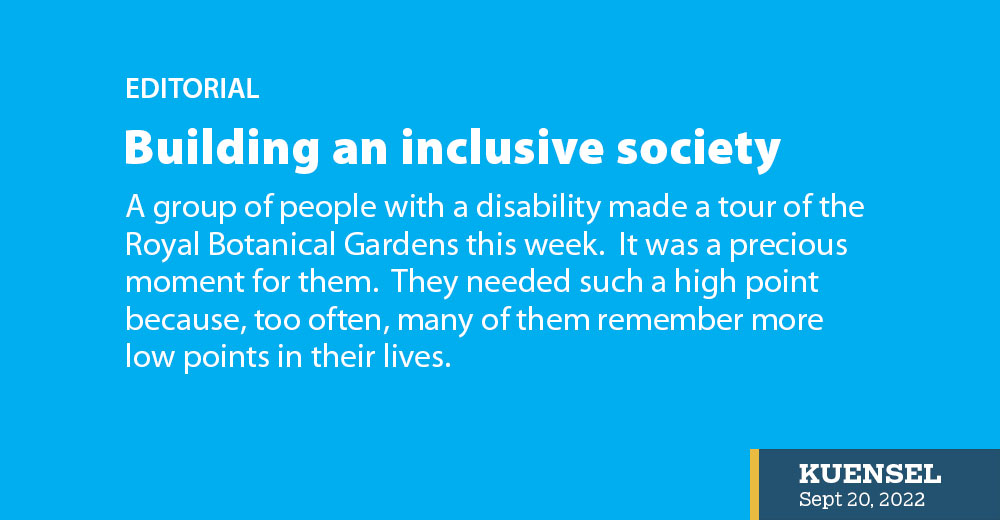A group of people with a disability made a tour of the Royal Botanical Gardens this week. It was a precious moment for them. They needed such a high point because, too often, many of them remember more low points in their lives.
But, as society, both within officialdom and outside, what are we doing about such a group of people?
In the past, our physically and mentally disabled had responsibilities in their homes and in their communities. Disability was an inconvenience, particularly given our rugged terrain, but it was not a stigma. Rural life demanded a variety of tasks and everyone had a role in community life.
With “progress”, which seems to include a move to city life, we have forgotten the disabled. None of our public facilities, including banks and post offices, are disabled-friendly. Thimphu, Phuentsholing, and other towns are difficult places for our disabled.
The 2017 Population and Housing Census estimate that 2.1 percent of Bhutan’s population, or 15,567 Bhutanese, live with some form of disability. There are about 200 persons with disabilities in Thimphu.
Providing special facilities in all public buildings can be expensive and, therefore, is done more in developed countries. It is done with strict legislation and wide social acceptance. Most developing countries apparently cannot afford facilities like ramps and elevators. The people are used to a more basic standard of living; such facilities are often viewed as luxuries.
But Bhutan, the land of compassion and GNH, has no excuse. Sensitivity to humane issues should take precedence over the rush to build more concrete showpieces. We started late and all our public service buildings are being constructed with the advantage of this foresight.
We have the policy as well as architectural regulations in place. For example, it is required that public service buildings must have ramps for the disabled. Yet there are no facilities in most buildings. Ironically, there are ramps in some facilities, like the new BHUs in rural areas, but no roads leading to the buildings themselves.
Our policies need to be backed up with action. And this initiative needs to come from our decision makers because the disabled have no access to the dzongs and offices where the decision makers sit. They have no access to most lhakhangs or even public transport.
Ultimately all our disabled community is asking is for the right attitude. They don’t seek our sympathy, just our understanding. They would like us to recognise their problems and help them live normal independent lives.
We cannot be indifferent to their needs any longer. Failing to attend to these urgent needs is a slap across the face of our hallowed development philosophy of Gross National Happiness.


